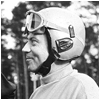22/12/1905 - 11/6/1955
Record updated 11-Jun-20
French sportsman, mainly remembered for a disaster that killed him and around 80 spectators during the Le Mans 24 hours automobile race in 1955.

French sportsman, mainly remembered for a disaster that killed him and around 80 spectators during the Le Mans 24 hours automobile race in 1955.
Born Pierre Bouillon in Paris, he took the racing name Levegh in memory of his uncle, a pioneering driver who died in 1904. Levegh was also a world-class ice hockey and tennis player. In motorsport he competed in Formula 1 for the Lago-Talbot team in 1950 and 1951, starting six races, retiring in three, and scoring no points.
At Le Mans he raced for Talbot in four races, finishing fourth in 1951. In 1952, driving single-handedly, his car suffered an engine failure in the last hour of the race with a four lap lead. This failure was probably caused by a missed gear change due to driver fatigue. In 1953 he came in eighth, and in 1954 he was involved in an accident in the seventh hour of racing.
In 1955 he was tempted away from Talbot and joined the American John Fitch in racing a Mercedes 300 SLR. In the third hour of racing, while on the Tribunes Straight, he clipped the Austin-Healey of Lance Macklin that was forced to make an evasive move after Mike Hawthorn dove into the pits. After hitting an earth bank, the car flew through the air, disintegrating, scattering components into the crowd. Levegh was killed, as were 86 spectators, while over 100 were injured. The race was continued in order to prevent the spectators from leaving, which would have blocked all access roads and the ambulances.
While Mercedes withdrew from the race as a sign of respect to the victims (and later from motor racing in general for the next 30 years), Mike Hawthorn continued on to win the race. The accident was a major contributor to changing attitudes about the acceptance of danger in motor racing and an increase in the desire to make courses safer for spectators and drivers alike. The small British firm of Bristol Cars, whose entrants achieved a 1-2-3 finish in the 2-litre class at Le Mans that year, decided to abandon racing altogether as a result of the tragedy, scrapping all but one of their racing cars.